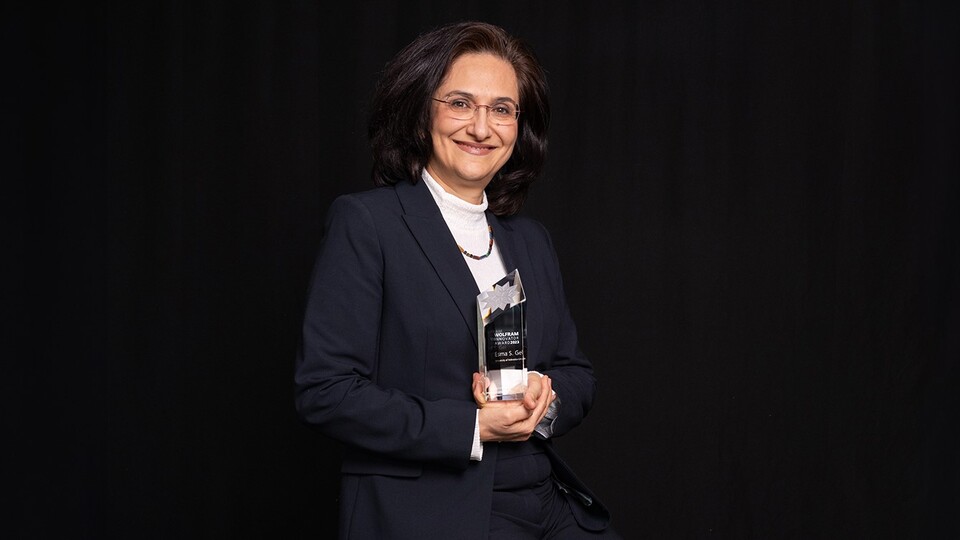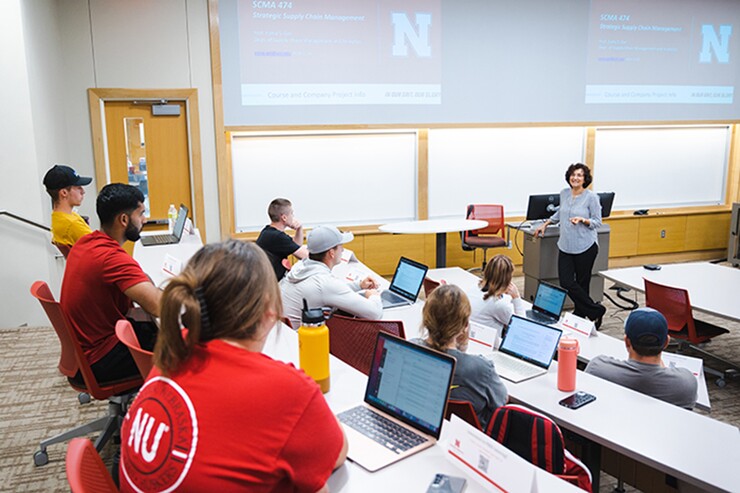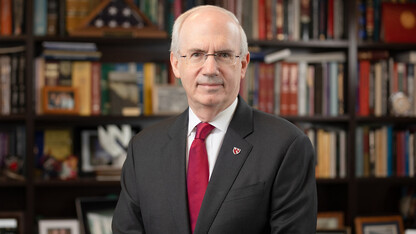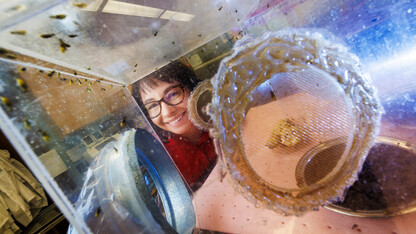· 6 min read
Gel honored for innovative work to project spread of infectious diseases

Esma Gel, the Cynthia Milligan Chair of Business at the University of Nebraska–Lincoln and professor of supply chain management and analytics, and a team of collaborators received a $3.5 million grant from the National Institutes of Health to help public health experts respond to the spread of infectious diseases. As a result of her work with researchers at Northern Arizona University and Arizona State University to produce accurate projections for COVID-19 cases, hospitalizations and deaths in Arizona, Gel received the Wolfram Innovator Award in November.
“I was the technical lead in a tri-university group that reported periodic COVID-19 projections to the State of Arizona Department of Health Services and the public. Using the software platform Mathematica to compute a carefully parameterized Susceptible, Infectious and Recovered (SIR) model, we generated answers to various ‘what if?’ policy questions,” Gel said. “The projections informed various policy decisions during the pandemic.”
Joseph Mihaljevic, an assistant professor at the School of Informatics, Computing and Cyber Systems of Northern Arizona University, then converted Gel’s Arizona-wide SIR model into more localized models to produce predictions for different counties and towns in Arizona.
“After the pandemic, Joe led the writing of the National Institutes of Health proposal based on our direct real-life experience, and I wrote the research tasks on the development of an optimization engine for resource allocation for public health agents to use,” Gel said.
The NIH-funded project is called Epidemiological Modeling Resources for Public Heath (EpiMoRPH). Gel, Mihaljevic and the team are developing a platform that compares multiple models to determine their accuracy and the situations or areas in which they perform best. The collaboration also includes Arizona State University, Northwestern University and TGen North.
“Epidemiological modeling is a critical tool for understanding the dynamics of pathogen transmission and predicting future outcomes, supporting public health responses. The NIH funding to develop EpiMoRPH will provide a framework for characterizing meta-population disease models, supporting rapid model development and uniform evaluation of models against data benchmarks. EpiMorph will prototype a foundation for the next generation of epidemiological modeling that increases automation, promotes sharing and collaboration, accelerates discovery and rapidly advances our understanding of epidemics,” Gel said.
With limited resources to control the spread of disease, public health practitioners must make data-informed decisions about where to apply interventions while also increasingly considering the equitable distribution of interventions across ethnic, racial and socioeconomic sectors. Gel shared how EpiMoRPH targets the development of an integrated suite of tools through advanced optimization technologies to ensure efficient, effective, and equity-focused use of resources during a pandemic. The team plans to build a coalition of stakeholders to ensure they address the realistic and evolving priorities of public health partners while maintaining the academic rigor and appeal of their modeling and statistical methods.
“EpiMoRPH will work to dissolve barriers between modelers and public health practitioners, facilitating preparedness for ongoing and emergent epidemic threats,” she said. “A paper is currently under revision that explains the state-of-art use of optimization methods for resource allocation during pandemics. We are currently developing the technical innovations necessary to achieve the aims started in the grant.”
Gel earned the Wolfram Innovator Award for her extensive use of Mathematica while producing accurate COVID-19 projections. Her work also received significant coverage by the local media outlets. She was honored during the Wolfram Virtual Technology Conference held Nov. 1-3.
“This work is about changing the future and how we predict disease. Serving as the technical lead during the COVID-19 pandemic has been a truly rewarding experience, and I am humbled to have received a 2023 Wolfram Innovator Award,” Gel said. “I am also truly honored to be named the first-ever Cynthia Hardin Milligan Chair of Business. Dean Milligan made tremendous contributions to the college and the University of Nebraska. I find it inspiring and will try to live up to her and her family’s legacy in supporting the college and the university’s mission.”
Gel came to Nebraska in the spring of 2022 with a strong research background focusing on collaborations between industry and the public sector, including those with practitioners from health care, manufacturing, agriculture and airlines. Her research has been supported through funding from the National Institutes of Health (current) and National Science Foundation, as well as industry partners, such as Mayo Clinic and Intel, and she published in many leading journals, including Operations Research and Decision Sciences and elite medical journals like The British Journal of Medicine.
Beyond her research, Gel uses her talents to help students learn about analytics. She teaches a doctoral seminar course, an undergraduate operations management course and the capstone course for graduating supply chain management majors at Nebraska.
“I truly believe that the next generation of business leaders will have to possess a solid understanding of various analytics techniques, ranging from descriptive to predictive to prescriptive analytics. While companies are getting increasingly mature in using descriptive and predictive analytics tools, they have increasing needs in prescriptive analytics techniques that go beyond assessing current performance to improving performance through optimized decision making,” Gel said.
In the capstone course, she partners with businesses on four student projects each fall and about 10 every spring. Capstone project sponsors in Gel’s capstone course include leading Nebraska-based businesses such as Conagra Foods, Crete Carrier, Fastenal, Werner Enterprises and Speedway.
“I strive to form productive, long-lasting partnerships with the sponsor companies, recognizing their contributions to our program and students. I try to build on the previous semesters’ projects and expand on the project scope to improve the usefulness of the results. Last semester, a project sponsor implemented our students’ findings and commented that the recommendations were working exactly as indicated by the team’s analysis, resulting in great operational savings for the company.”
Key takeaways that Gel targets in the capstone course include excellent work ethic, communication and teamwork habits. They also must define the right problems to attack, choose the appropriate analysis and visualization methods, draw the right conclusions, translate them to actionable recommendations and convey results effectively.
“I love working with students on these open-ended, real-life problems from industry and mentoring them through the process, taking them from problem definition to producing actionable recommendations. I also enjoy receiving positive feedback from companies about our students and seeing the measurable growth in our students’ critical thinking, analytics and presentation skills,” Gel said. “My teaching experiences in the capstone course have already impacted my research as well, as I am writing a paper inspired by a problem from one of our partnering companies.”








